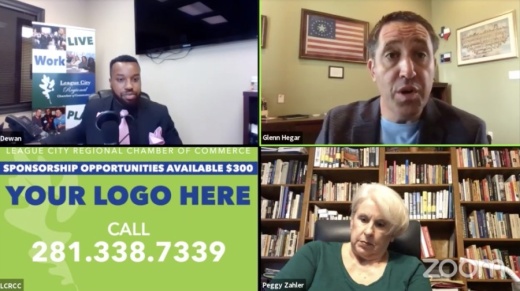"February—it seems like it was so, so many years ago," Hegar said in a conversation July 23 with the League City Regional Chamber of Commerce.
Hegar delivered this update on the state of Texas' economy amid the coronavirus outbreak and highlighted measures state officials have taken to mitigate its damage.
On July 20, Hegar released updated revenue estimates for the 2020-21 biennium, which outlined a projected $4.6 billion loss due to COVID-19.
When the state comptroller's office submits revenue estimates, Hegar said, the process is a forecast based on combined analyses of job growth, new citizenry and the prosperity of key industries, such as oil and gas.
“That crystal ball is usually [clouded] with uncertainty," Hegar said.
Texas gained more than 300,000 jobs in 2019 alone. Within the past decade, 2.5 million jobs have been added in Texas, which represents nearly 25% of total job creation in the United States during the same time frame, Hegar said.
Because of the COVID-19 pandemic, hotel, leisure and hospitality, service, mining and oil industries have taken significant revenue slashes and suffered substantial job losses.
Every two years, Hegar said, a portion of accumulated revenue from the oil industry goes into the state's general treasury fund, while 37.5% goes into state savings and 37.5% is allocated to the state's highway fund. The state initially projected $1.6 billion in revenue going into state savings in 2020 and 2021; that amount has dropped to $1.1 billion due to COVID-19.
As Texas' economy continues to reopen, Hegar said public health and safety are paramount in ensuring the stability of the state's fiscal status. The health of a state's economy, Hegar said, is dependent on the safety of its workforce.
With Hegar's revised revenue estimates, he is proposing agencies reduce expenditures by 5% for the duration of the fiscal year 2020-21 budget. Given the current biennium only has 15 months remaining, those cuts create a reduction of closer to 8.5%, Hegar said. He added the comptroller's agency has enacted a hiring freeze and placed a halt on pay increases to help create cost savings.
As the coronavirus pandemic continues to play out, Hegar said he and his team will continually monitor the state's unemployment and employment levels; Texas' gross domestic product; frequency of travel, mobility and hotel occupancy in the coming months; and sales tax revenue collections. With Texas' economy being the ninth-largest in the world, Hegar said he will closely monitor the status of the global economy and Texas' international partners to help project fiscal health.
The state of Texas has received more than $13 billion in federal funds for statewide relief, Hegar said. The Texas Department of Emergency Management oversaw the distribution of that funding and how it was allocated to local government entities.
Now, Hegar said, is an especially crucial time to re-evaluate small business owners' thoughts, opinions and perspectives on their needs as well as to revisit regulations placed on business activity. He said the state needs to work to ensure that government rules and regulations are not preventing local businesses from creating jobs and economic opportunities for their immediate communities.
“Small businesses are the place of creativity, the creation of innovation," Hegar said.





